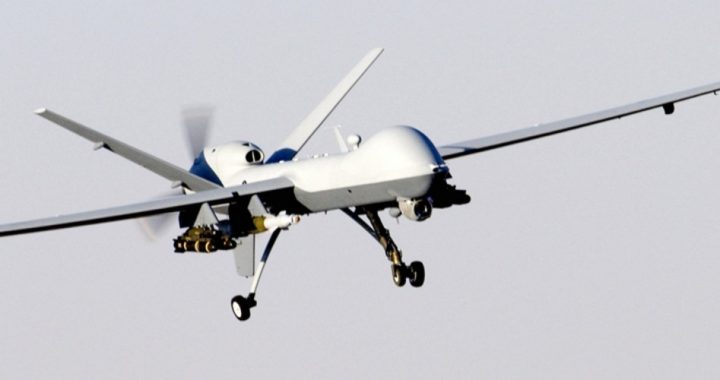
Connecticut legislators are battling over whether local police departments should be allowed to utilize weaponized drones. The bill presently under consideration in Connecticut would make it unlawful for someone “who is not physically present to release tear gas or control a deadly weapon, explosive or incendiary device,” and would “limit the use of a drone by law enforcement and other state agencies.” Other restrictions on the use of drones in the proposed law included a requirement that police get a warrant before drones are used in surveillance.
David McGuire of the American Civil Liberties Union (ACLU) testified in favor of the legislation, stating, “We are concerned that there could be a misuse.”
The weaponized drone question is just the latest in the national debate over the proper use of drones and other military-type weapons by local law enforcement. Senator Rand Paul (R-Ky.) filibustered for almost 13 hours in 2013 against the nomination of John Brennan to head the CIA, in order to force the Obama Justice Department to answer the question of whether it was legal for the federal government to use drones to kill U.S. citizens on American soil.
Paul’s filibuster won broad support, including backing from Senator Ted Cruz (R-Texas) and Senator Marco Rubio (R-Fla.), then expected opponents for the Republican Party nomination, and finally, even some Democrats.
A Gallup Poll revealed that 79 percent of Americans backed Paul’s contention that drone strikes should not be used on American soil against Americans suspected of terrorism. Only 13 percent believed it would be acceptable to kill Americans, by use of a drone, without any due process.
Attorney General Eric Holder eventually issued a letter conceding that the United States would not use lethal drones against noncombatant Americans on American soil simply because they were suspected of terrorism.
Since such an overwhelming number of Americans oppose such use of drones by the federal government to kill Americans without due process of law, it is reasonable to assume that there is likewise a great amount of opposition for the used of weaponized drones by local police departments.
In recent years, the possession and use of weapons of war by local police against suspected criminals has drawn some degree of controversy. Even tanks and battering rams have been used by local law enforcement. The ACLU claims that there are over 100 paramilitary-style raids in the United States on a daily basis. For example, a Special Weapons and Tactics (SWAT) team in Atlanta recently threw a live flash grenade into the crib of a two-year-old. The toddler was severely injured.
While most of these military-style raids involve suspected drug dealers, they have also been deployed against people simply suspected of credit-card fraud.
“Neighborhoods are not war zones,” argued the ACLU in its report.
But some police departments are opposed to the legislation limiting the use of weaponized drones.
The Berlin, Connecticut, chief of police, Paul Fitzgerald, told legislators, “I think it’s important not to limit law enforcement or public safety’s ability to protect the public…. We have to be prepared to handle unforseen situations … at a public event, a crime or a terrorist incident.”
And Paul Melanson, the Farmington police chief, took the position that weaponized drones should be able to be used in high-risk situations. He offered the example that if police could “use a robot” (such as a drone) the officer could be kept “safe.” Melanson argued that police need the authority to use weaponized drones, raising the specter of terrorist activities: “We’ve had a report that somebody’s going to fly a drone into an airplane, into an engine, or it’s a weaponized drone. We’re concerned and we don’t have those answers yet.”
While most Americans should certainly sympathize with the work of local police in protecting the general public from all sorts of criminal or terrorist activity, placing weaponized drones in the hands of police all across the country is something that should be approached with extreme caution — especially with the push to nationalize the general police power. The effort to blur the lines between police and the military forces should certainly be opposed.
Photo of MQ-9 Reaper Unmanned Aerial Vehicle



